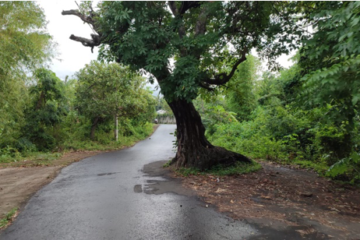Erotic Ecology: Ecosexuals and F#$% for Forest

One of the ideas behind queer studies is that heteronormativity is an essential part of what keeps us locked into hierarchies of oppression, at the base of which is human exceptionalism. Humans, that is, are somehow different from the rest of the natural world. But, as critical theories of all kinds have shown, the understanding of that “exceptional human” is based upon a colonial, sexist, racist, ableist, heterosexist, and cis-gendered understanding of what it means to be human. One way to begin to unravel the system of oppressions based upon human exceptionalism, then, is to challenge ideas about sex and sexuality. We are all (humans and all other sorts of creatures) embodied, and these bodies are connected through the circulation of common elements—earth, air, fire, and water—and through touch. How might certain forms of sexuality and touch threaten the system of patriarchy and human exceptionalism in ways that lead to their exclusion from what is “normal,” and how might challenging sexuality norms also challenge human exceptionalism? I want to provide examples of two groups that use sex and sexuality for eco-activism.
Annie Sprinkle and her partner Beth Stephens, both environmental and sex positive advocates in the San Francisco area, have been encouraging erotic desires for nature through bodies for decades. They have also been staging protests against mountain top removal and deforestation. Sometimes these protests involve holding wedding ceremonies in which the two of them or other self-identified ecosexuals get married to mountains, forests, rivers, and trees. More recently, they codified their own thoughts about what ecosexuality is in their “Ecosexual Manifesto.” Throughout their work, they argue for a new type of sexuality that finds romantic love with the entire planet and the individuals therein.
Sprinkle and Stephens argue that this romantic love is at the heart of a new type of romanticism, one that understands our bodies as intimately connected with other bodies on the evolving planet. According to them, ecosexual is not an exclusive identity, so one can identify as LGBTQIA+ or even heterosexual and still be ecosexual. It only requires an opening up to the principles laid out in their manifesto. The five points of the manifesto are as follows:
- We are the ecosexuals. The Earth is our lover.
- We make love with the Earth. We are aquaphiles, terraphiles, pyrophiles, and aerophiles.
- We are a rapidly growing global community of ecosexuals.
- We are ecosex activists. We will save the mountains, waters, and skies by any means necessary, especially through love, joy, and our powers of seduction.
- Ecosexual is an identity. For some of us, being ecosexual is our primary (sexual) identity, whereas for others it is not. Ecosexuals can be GLBTQI, heterosexual, asexual, and/or other.
The ecosexual movement is calling for new ways of understanding our entire bodies as erogenous zones. When we recognize our connections to earth, air, water, and fire, we can see that we are attracted to the Earth on a moment-by-moment basis. What happens, then, when we live in societies that try to wall us off or take us away from the Earth? Perhaps if we learned to practice an eros-sophy (alongside of our philo-sophy), we would be able to think, feel, and imagine the multitude of bodies that make up this planet in more positive and pleasurable ways. This “posthumanist” way of living acknowledges our evolving embeddedness within the planetary community in positive and material affirming (rather than denying) ways. And it is, perhaps, from this place of affirmation that we can begin to re-think our knowledge-making disciplines from a planetary perspective.
A second activist group, fuck for forest, began with a few activists in Norway in 2004. Over the years they have received support from numerous people and places, including from Annie Sprinkle and Beth Stevens, and famous clubs like the Kit-Kat in Berlin. The founders, Tommy Temblor and Leona, were originally funded by the Norwegian government, but that funding quickly disappeared after public scrutiny that the government was subsidizing porn. Importantly, their decision to start fuck for forests arose after several mushroom trips and encounters with shamans. They decided they had to do something to protect the Amazonian rainforests and decided that they could raise money by having public sex (especially outside in nature) and asking for donations. There is, of course, a critique to be made about cultural appropriation by two white environmental activists who sometimes sport dreads and somewhat naïvely enter into situations with Indigenous communities without really understanding the full history or context of what they are doing. Along with this valid critique, they are actually working with Indigenous communities (and others) to help protect forests.
At the heart of their ideas is a critique of both repressed sexuality and consumerism. Why, for instance, is it natural to drive a gas-guzzling car or go to a mall and shop, and it is shameful to be naked in public or watch others receive pleasure in outdoor places? In a sense, they would argue as the ecosexuals mentioned above, that our entire bodies are erotic, and bodies are meant to enjoy one another. In an older documentary about the project, founding member Leona also includes a critique of the ways in which Christianity and its spread helped to cut us off from our bodies and the rest of the natural world.
They raise money by filming themselves having sex in trees, near streams, in meadows, and on rocks. They do follow a code of conduct and respect in an effort to avoid situations of exploitation. Since their founding, they now have over 8,000 content providers who “decided to share their bodies and love – for fun, freedom and forests.” They do this by donating erotic videos and images of themselves in outdoor locations which reside behind a paywall on the website, that users then pay a fee to get behind. They currently donate profits to forest saving initiatives in Peru, Mexico, Brazil, Costa Rica, Ecuador, Ukraine, Slovakia, and Germany.
In the case of both ecosexuals and fuck for forest, emphasis is placed upon the connections between our bodies, sexuality, as well as to one another and the rest of the natural world. Both of these organizations remind us that ecology, the science of entangled and evolving bodies, is at heart also about touch and the erotic nature of life.
—
Small note of thanks: A special thanks to Jeremy Kidwell for introducing me to the fuck for forests group at a conference in Potsdam, Germany in the summer of 2024.
#
Whitney A. Bauman is Professor of Religious Studies at Florida International University (FIU) in Miami, FL. He is also co-founder and co-director of Counterpoint: Navigating Knowledge, a non-profit based in Berlin, Germany that holds public discussions over social and ecological issues related to globalization and climate change. His areas of research interest fall under the theme of “religion, science, and globalization.” He is the recipient of a Fulbright Fellowship and a Humboldt Fellowship, and in 2022 won an award from FIU for Excellence in Research and Creative Activities. His publications include: Religion and Ecology: Developing a Planetary Ethic (Columbia University Press 2014), and co-authored with Kevin O’Brien, Environmental Ethics and Uncertainty: Tackling Wicked Problems (Routledge 2019); 3rdedition of Grounding Religion: A Fieldguide to the Study of Religion and Ecology, co-edited with Kevin O’Brien and Richard Bohannon, (Routledge 2023). He is also the co-editor with Karen Bray and Heather Eaton of Earthly Things: Immanence, New Materialisms, and Planetary Thinking (Fordham University Press 2023). His next monograph is entitled, A Critical Planetary Romanticism: Literary and Scientific Origins of New Materialism (Columbia University Press, forthcoming 2025).
Counterpoint blogs may be reprinted with the following acknowledgement: “This article was published by Counterpoint Navigating Knowledge on 1 October 2024.” The views and opinions expressed on this website, in its publications, and in comments made in response to the site and publications are those of the author(s) and do not necessarily reflect the views and opinions of Counterpoint: Navigating Knowledge, its founders, its staff, or any agent or institution affiliated with it, nor those of the institution(s) with which the author is affiliated. Counterpoint exists to promote vigorous debate within and across knowledge systems and therefore publishes a wide variety of views and opinions in the interests of open conversation and dialogue.
Photo credits: © Jonny Lindner, “Mother Earth.” Free download from PublicDomainPictures.



0 Comments